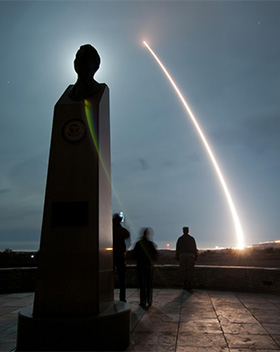In a unique and unprecedented event, the last three former directors of the Missile Defense Agency (MDA)—Lt. Gen. Ronald T. Kadish, USAF (Ret.), LTG Patrick O’Reilly, USA (Ret.), and Lt. Gen. Henry A. Obering, USAF (Ret.)—discussed the impact MDA has had in helping the US military acquire the necessary missile defense capabilities to compete in the 21st century security environment.
O’Reilly, who was MDA director from 2008 to 2012 and is now a Scowcroft Center non-resident senior fellow, mentioned how far missile defense has come in the United States. Looking at the past fifteen-year span from 1999-2014, he pointed to the steady rate of growth and progress in capabilities. If the United States projects out another fifteen years, we can expect another significant positive change in missile defense that will give the US military newer, more effective capabilities. Indeed, the hope is that these new systems can help “disrupt, interfere, and destroy” the threats that have messed with US interests over the last thirty years.
Obering, MDA director from 2004 to 2008, mentioned MDA’s key role in giving the US military a capability it did not have before. Now, thanks to MDA’s efforts, the US military has a core competency that gives it an edge in power projection and deterrence across the globe. The United States is now benefitting from missile defense, a capability that is now proliferating, but that in 2004 had the United States feeling like the “Long Ranger” because no other country was focusing on it. Finally, because it is still a relatively new capability that the United States keeps trying to update, failures will continue to occur. Yet, “that’s how you learn,” Obering said, and it is how you overcome the challenges of creating an unprecedented capability from scratch.
Finally, Kadish, MDA director from 2002 to 2004, discussed the resources needed to continue funding missile defense. The United States plans to have other countries cooperate with it on missile defense, but “the wheels of cooperation spin around the axis of money,” he said. Other countries, in an era of budget austerity, must make the choice to fund missile defense as opposed to other capabilities. Each country’s decision is, at root, a personal one. For the United States, it too must decide what resources it wants to put into funding missile defense. To legitimate funding for these programs requires consensus on the technology, the budget, the threat perception, and the technical aspects of the program, all of which are not easy to come by.
These generals, together on stage in public for the first time, gave an interesting look into the bureaucratic, technical, and geopolitical aspects to missile defense and provided insights that only men that served in their former position could provide. It was a keynote discussion worthy of this fantastic conference.
This panel was part of the Atlantic Council’s annual conference on the United States and Global Missile Defense which focuses on recent developments in missile defense architectures in Europe, the Middle East, and Asia and how global missile defense is likely to look in the year 2030.
